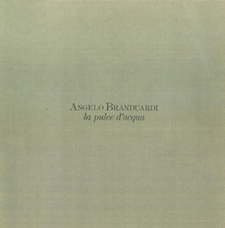La Pulce d’Acqua (1977)
Il Ciliegio
Angelo Branduardi

Il Ciliegio
Testo
Testo
Già ero vecchio e stanco
per prenderla con me,
ma il vecchio giardiniere
rinunciare come può
all'ultimo suo fiore,
se l'inverno viene già.
Già ero vecchio e stanco,
ma la volli per me
e il sorriso della gente
di nascosto accompagnò
il mio andare verso casa
e l'inverno viene già...
Lei era la più bella
che avessi visto mai:
sorrideva fra le ciglia
e il mio cuore riscaldava,
era l'ultimo mio fiore
e l'inverno viene già..
Poi anche il mio cillegio
a suo tempo maturò;
lei venne un mattino
a chiedernnene i frutti.
"Devo avere quelle ciliegie
perche presto un figlio avrò".
Io guardavo le sue guance:
più bella era che mai.
e sentivo dentro me
già crescere la rabbia:
"Chiedi al padre di tuo figlio
di raccoglierle per te".
Sorridendo come sempre,
le spalle mi voltò
e la vidi in mezzo ai prato
verso l'albero guardare:
era l'ultimo mio fiore
e l'inverno viene già.
Fu il ramo suo più alto
che il ciliegio chinò
ed il padre di suo figlio
così I'accontentò.
Già ero vecchio e stanco
per prenderla con me,
ma il vecchio giardiniere
rinunciare come può
all'ultimo suo fiore,
e l'inverno viene già.
per prenderla con me,
ma il vecchio giardiniere
rinunciare come può
all'ultimo suo fiore,
se l'inverno viene già.
Già ero vecchio e stanco,
ma la volli per me
e il sorriso della gente
di nascosto accompagnò
il mio andare verso casa
e l'inverno viene già...
Lei era la più bella
che avessi visto mai:
sorrideva fra le ciglia
e il mio cuore riscaldava,
era l'ultimo mio fiore
e l'inverno viene già..
Poi anche il mio cillegio
a suo tempo maturò;
lei venne un mattino
a chiedernnene i frutti.
"Devo avere quelle ciliegie
perche presto un figlio avrò".
Io guardavo le sue guance:
più bella era che mai.
e sentivo dentro me
già crescere la rabbia:
"Chiedi al padre di tuo figlio
di raccoglierle per te".
Sorridendo come sempre,
le spalle mi voltò
e la vidi in mezzo ai prato
verso l'albero guardare:
era l'ultimo mio fiore
e l'inverno viene già.
Fu il ramo suo più alto
che il ciliegio chinò
ed il padre di suo figlio
così I'accontentò.
Già ero vecchio e stanco
per prenderla con me,
ma il vecchio giardiniere
rinunciare come può
all'ultimo suo fiore,
e l'inverno viene già.
Il Ciliegio
note e significato
note e significato
Il Ciliegio è stato scritto da Luisa Zappa, adattando la canzone medioevale The Cherry Tree Carol, il cui testo originale è riportato di seguito.
The Cherry Tree CarolJoseph was an old man, and an old man was he,
when he wedded Mary in the land of Galilee.
Joseph and Mary walk'd through an orchard good,
where was cherries and berries so red as any blood.
Joseph and Mary walk'd through an orchard green,
where was berries and cherries as thick as might be seen.
O then bespoke Mary, so meek and so mild,
‘Pluck me one cherry, Joseph, for I am with child.'
O then bespoke Joseph with words so unkind,
‘Let him pluck thee a cherry that brought thee with child.'
O then bespoke the babe within his mother's womb,
‘Bow down then the tallest tree for my mother to have some.'
Then bow'd down the highest tree unto his mother's hand:
when she cried, ‘See, Joseph, I have cherries at command!'
O then bespake Joseph— ‘I have done Mary wrong;
but cheer up, my dearest, and be not cast down.
‘O eat your cherries, Mary, o eat your cherries now;
o eat your cherries, Mary, that grow upon the bough.'
Then Mary pluck'd a cherry as red as the blood;
then Mary went home with her heavy load.
As Joseph was a-walking, he heard an angel sing:
‘This night shall be born our heavenly King.
‘He neither shall be born in housen nor in hall,
nor in the place of Paradise, but in an ox's stall.
‘He neither shall be clothéd in purple nor in pall,
but all in fair linen, as were babies all.
‘He neither shall be rock'd in silver nor in gold,
but in a wooden cradle that rocks on the mould.
He neither shall be christen'd in white wine nor red,
but with fair spring water with which we were christenéd.
Then Mary took her young son and set him on her knee;
‘I pray thee now, dear child, tell how this world shall be.'—
‘O I shall be as dead, mother, as the stones in the wall;
o the stones in the street, mother, shall mourn for me all.
‘And upon a Wednesday my vow I will make,
and upon Good Friday my death I will take.
‘Upon Easter-day, mother, my uprising shall be;
o the sun and the moon, mother, shall both rise with me!'